 Petzlover
Petzlover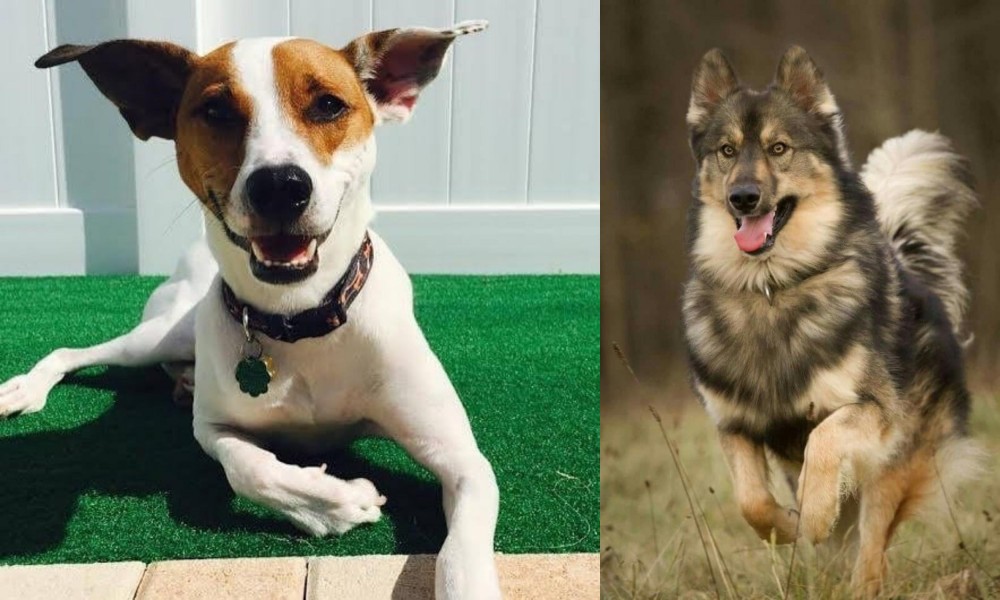 Both Feist and Native American Indian Dog are originated from United States. Feist may grow 22 cm / 9 inches higher than Native American Indian Dog. Feist may weigh 105 kg / 231 pounds lesser than Native American Indian Dog. Both Feist and Native American Indian Dog has almost same life span. Feist may have less litter size than Native American Indian Dog. Feist requires Low Maintenance. But Native American Indian Dog requires High Maintenance
Both Feist and Native American Indian Dog are originated from United States. Feist may grow 22 cm / 9 inches higher than Native American Indian Dog. Feist may weigh 105 kg / 231 pounds lesser than Native American Indian Dog. Both Feist and Native American Indian Dog has almost same life span. Feist may have less litter size than Native American Indian Dog. Feist requires Low Maintenance. But Native American Indian Dog requires High Maintenance
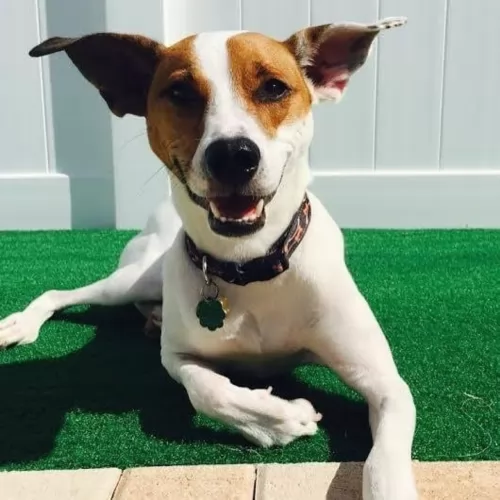 The Feist is a small dog from the United States, coming from Terrier dogs which were brought over to the States. It is believed that these Terriers included crosses between several terriers – the Manchester Terriers, Smooth Fox Terrier and English White Terrier – dogs used as ratters and known for their skills in killing rats.
The Feist is a small dog from the United States, coming from Terrier dogs which were brought over to the States. It is believed that these Terriers included crosses between several terriers – the Manchester Terriers, Smooth Fox Terrier and English White Terrier – dogs used as ratters and known for their skills in killing rats.
The Feist isn’t a new type of dog and in fact there are records of the dog which go back centuries. George Washington even referred to them in 1770 already, and the breed was popularized by President Teddy Roosevelt, who hunted with his Feist.
 The Native American Indian Dog is an ancient breed, that some consider to be feral. It is a landrace breed that developed with the indigenous peoples North America. These dogs originally looked and sounded like wolves and it is likely that their ancestry is tied to wolves crossed with pre-Columbian American dogs that came to the America’s with the first peoples. There are some that believe the Native American Indian Dog is a connecting line back to the dogs or wolves that over 12,000 years ago were the first to be domesticated by human beings.
The Native American Indian Dog is an ancient breed, that some consider to be feral. It is a landrace breed that developed with the indigenous peoples North America. These dogs originally looked and sounded like wolves and it is likely that their ancestry is tied to wolves crossed with pre-Columbian American dogs that came to the America’s with the first peoples. There are some that believe the Native American Indian Dog is a connecting line back to the dogs or wolves that over 12,000 years ago were the first to be domesticated by human beings.
They are now a rare breed in the wild and a small group of domesticated dogs. Fossil studies in recent years suggests that the Native American Indian Dogs came to North America about 4500 years after the first indigenous peoples. It is believed that the Native Americans bred the dogs that traders and explorers brought with them to the native coyote as well. This created a breed specific to North America and called the Common Native Dog or the Common Indian Dog. The original NAID was a mix of many different breeds of dogs and wild canines.
Today’s NAID is said to be raised on Indian reservations in the United State and represent a mix of Chinook, Husky, German Shepherd Dog and Malamute, along with perhaps some of today’s wolf mixed in. This dog is raised domestically and is socialized to life with humans. They are the last remaining breed from all the Native North American dogs that lived with the original people of the Americas. They are also thought to have an ancestry similar to the Australian Dingo.
They are a devoted, protective and loyal breed though they tend to be shy. They need to be outside for the majority of the day and don’t do well in crates. They need a fenced yard and room to roam. They are working dogs that hunted, pulled sleds and guarded their homes. They still need a job to so.
Today the North American Indian Dog is being bred to replicate the temperament and appearance of the originals. Although there are many breeders working from the founding breeder with original stock, there are only six that are officially given authorization to breed the NAID. They are registered by Terra Pines with the National Kennel Club but not recognized by the AKC and UKC.
The breed name NAID is trademarked by Karen Markel of Majestic View Kennels in the 1990’s. Today the breed is nationally recognized as a breed very much like the original Native American dogs, The breed is intelligent and quite healthy. They enjoy people and engage in many companion activities.
Whatever its true ancestry the current Native American Indian Dog (NAID), today’s version is not recognized by the AKC, but they are recognized by the Dog Registry of America, the Native American Indian Dog Registry and the National Kennel Club.
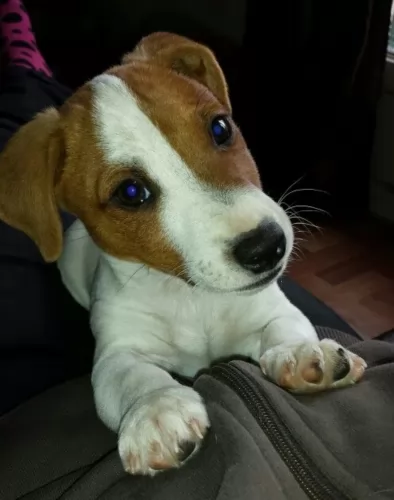 Standing at about 46cm to 56cm in height and weighing in the region of 10 to 15kg, the Feist is a short haired dog that doesn’t shed much and he is not hypoallergenic.
Standing at about 46cm to 56cm in height and weighing in the region of 10 to 15kg, the Feist is a short haired dog that doesn’t shed much and he is not hypoallergenic.
The coat of the dog is available in a variety of colors but they are essentially a bi-colored dog such as red and white, tan and white, black and white, while solid colors are fawn, white, light brown, black and brindle too.
Perhaps because of so many genes being involved with this dog, it is more easily identified because of its hunting abilities. He is a sturdy dog with a medium length tail which he holds up. Some Feist owners prefer the look of a docked tail and then docking is between the second and third joint of the tail. The Feist has erect or semi-erect ears.
Intelligent and alert, the Feist is a dog that will respond well to training. As with any other dog, training and socialization will be important for him so that he is obedient. He is energetic, curious and alert and above all he wants the attention of his human family.
 There are two sizes of the North American Indian Dog – they are medium and large. They have dense short double coats, or they have long top coats and a fairly dense undercoat. They come in a variety of colors mostly black or silver but there is also a tortoiseshell. These tortoiseshell colored dogs are considered by Native Americans to be sacred beings. These tortoiseshell dogs are strikingly good looking and are called Spirit Dog.
There are two sizes of the North American Indian Dog – they are medium and large. They have dense short double coats, or they have long top coats and a fairly dense undercoat. They come in a variety of colors mostly black or silver but there is also a tortoiseshell. These tortoiseshell colored dogs are considered by Native Americans to be sacred beings. These tortoiseshell dogs are strikingly good looking and are called Spirit Dog.
They all have the look of a Siberian Husky or Alaskan Malamute with upright ears and almond shaped eyes that are anywhere from amber to brown with some blue. Usually their tails are down and long but can be curled. They resemble the wolf and have that wild, feral appearance. They can be as large as over one hundred pounds or average seventy to eighty pounds. They are strong, alert and intelligent. They are considered to be hypoallergenic, shedding their coat only once a year.
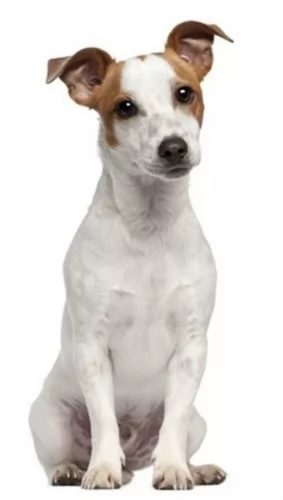 Loving to be around his human family and being a devoted and loyal canine friend, the Feist is also an intelligent, energetic dog who is fairly easy to train.
Loving to be around his human family and being a devoted and loyal canine friend, the Feist is also an intelligent, energetic dog who is fairly easy to train.
Bright and alert he makes a good watchdog too, but is amicable enough to get on well with other pets in the home as well as with children.
He can be stubborn so training and socialization will be important for him. As it is, he likes a firm, strong owner and in exchange for good care, he will become your devoted, loyal friend.
 This breed is gentle and loving with children.
This breed is gentle and loving with children.
Endurance, strength and good health.
Low adaptability to small living spaces and lack of outside space; don’t do well in crates and need an experienced dog owner.
They are highly intelligent, love to learn and are just a little stubborn.
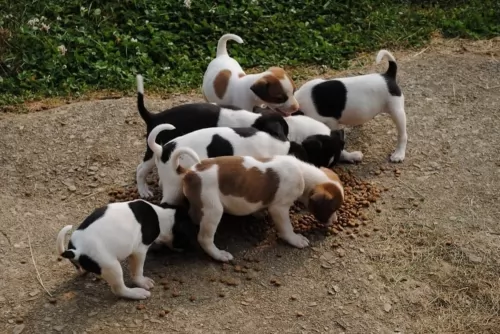 A Feist is a robust dog who doesn’t have any particular health issues, and with good care he can reach 18 years of age if looked after well. Hip Dysplasia is such a common dog illness that it always bears mentioning.
A Feist is a robust dog who doesn’t have any particular health issues, and with good care he can reach 18 years of age if looked after well. Hip Dysplasia is such a common dog illness that it always bears mentioning.
This is a ball and socket joint problem where the joint doesn’t function smoothly and the grinding of the bone leads to pain and arthritis for your pet. You'll notice he battles to play games anymore and he also battles to get up after lying down. You need to know that this disease isn’t reserved for old dogs but can start while your dog is still a puppy and that it can lead to lameness.
Look out for allergies in your dog as they can cause a host of problems which can include his skin, his breathing and problems with digestion. Typical symptoms of a dog with allergies include sneezing,scratching and very distressing for a dog, itchy and red skin which can eventually ooze.
As a responsible dog owner it is imperative when you detect problems with your dog, to get him to the vet immediately.
 This is a fairly healthy, long lived breed having spent so much of its history in isolation. They are prone to some of the issues that affect all medium to large breeds.
This is a fairly healthy, long lived breed having spent so much of its history in isolation. They are prone to some of the issues that affect all medium to large breeds.
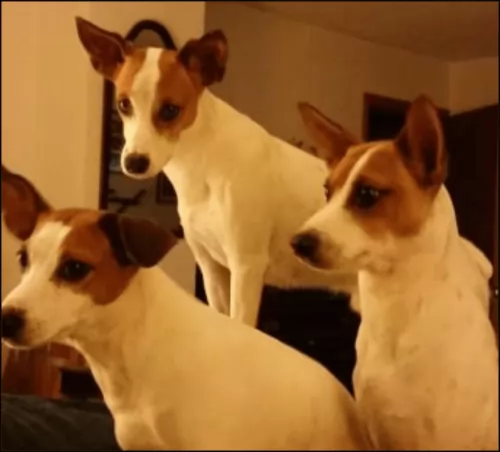 Grooming your Feist dog isn’t going to be costly or difficult at all, as with his short, smooth coat he will essentially only require a brush twice a week.
Grooming your Feist dog isn’t going to be costly or difficult at all, as with his short, smooth coat he will essentially only require a brush twice a week.
It’s good to get into the habit of brushing him as not only does it keep his coat sleek and shiny, he loves you paying him attention.
All dog owners need to know that grooming goes beyond just brushing the coat. You want to also check his nails that they are short, check in and around his ears and brush his teeth with special dog toothpaste and toothbrush.
Give your Feist the very best dog food there is. Home-made is always good but if you feed him commercially manufactured food, make sure its a quality one. Some raw meat added in every now and again is important for his health. Ensure fresh, cool water is available to him around the clock.
Your Feist is an energetic dog that has been accustomed to hunting and running down small prey. He is an outdoor dog, thriving on fun and games. Take him on your walks, your hikes or when you go cycling or swimming. He wants to be right there with you involved in everything. While he can slot into life in the city or the countryside, he isn’t an indoor dog and it certainly won’t be good for him if you keep him cooped up in a tiny garden and pretty much forget about him.
 Because of their propensity to grow to quickly the puppy should only stay on puppy food for 8-10 months. Feed them a high quality large dog puppy food 3-4 times daily for a total of 2-21/2 cups per day.
Because of their propensity to grow to quickly the puppy should only stay on puppy food for 8-10 months. Feed them a high quality large dog puppy food 3-4 times daily for a total of 2-21/2 cups per day.
Feed a high protein, large dog dry food twice a day for a total of two cups. Do not over feed. Do not feed right before or after exercise do to the risk of bloat.
Healthy, strong long lived dog.
This is not an indoor, couch potato dog. They need exercise and they need space. They won’t do well as apartment dogs unless you can take them to a dog park for over an hour every day. They really need a large fenced in yard. They don’t do well in crates either. He doesn’t understand crates and thinks you are punishing him. They make great hunters, search and rescue dogs, service dogs and therapy dogs. They will succeed at pulling competitions and weight competitions.